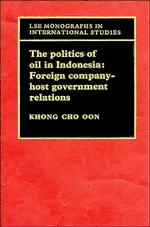Book contents
- Frontmatter
- Contents
- List of figures
- Acknowledgments
- 1 THE IMPACT OF THE FOREIGN COMPANY ON GOVERNMENT POLICIES IN LESS-DEVELOPED COUNTRIES
- 2 THE INDONESIAN PETROLEUM INDUSTRY: FORM AND CONTENT OF AGREEMENTS
- 3 FINANCIAL PROVISIONS AND CONSEQUENT AREAS OF DISPUTE
- 4 PROVISIONS FOR DEVELOPMENT AND NATIONAL CONTROL
- 5 PROBLEMS OF NEGOTIATION AND CONTRACTUAL CHANGE
- 6 ORGANISATIONAL STRUCTURE AND THE NEGOTIATING PROCESS
- 7 SOME REGIONAL CONSIDERATIONS FOR SOUTHEAST-ASIAN OIL-PRODUCER GOVERNMENTS
- 8 THE VIABILITY OF TRANSNATIONAL MINERAL AGREEMENTS
- Notes
- Select bibliography
- Index
1 - THE IMPACT OF THE FOREIGN COMPANY ON GOVERNMENT POLICIES IN LESS-DEVELOPED COUNTRIES
Published online by Cambridge University Press: 05 November 2011
- Frontmatter
- Contents
- List of figures
- Acknowledgments
- 1 THE IMPACT OF THE FOREIGN COMPANY ON GOVERNMENT POLICIES IN LESS-DEVELOPED COUNTRIES
- 2 THE INDONESIAN PETROLEUM INDUSTRY: FORM AND CONTENT OF AGREEMENTS
- 3 FINANCIAL PROVISIONS AND CONSEQUENT AREAS OF DISPUTE
- 4 PROVISIONS FOR DEVELOPMENT AND NATIONAL CONTROL
- 5 PROBLEMS OF NEGOTIATION AND CONTRACTUAL CHANGE
- 6 ORGANISATIONAL STRUCTURE AND THE NEGOTIATING PROCESS
- 7 SOME REGIONAL CONSIDERATIONS FOR SOUTHEAST-ASIAN OIL-PRODUCER GOVERNMENTS
- 8 THE VIABILITY OF TRANSNATIONAL MINERAL AGREEMENTS
- Notes
- Select bibliography
- Index
Summary
THE PROBLEM OF PERCEPTION
Investment by foreign firms in less-developed countries tends to give rise to political tensions which are the product of corresponding perceptions held by companies and host governments of a manifest imbalance in their respective bargaining strengths, whether economic or political. It is argued here that the problems arising from this sense of ‘imbalance’ are largely of a political nature and can only be resolved through the development of an underlying political consensus providing a basis on which common interests can coalesce, that is, constructive reciprocal relations between the purveyors of capital and technology on the one hand and the proprietors of natural resources and labour on the other. Economic concerns and market forces are in a sense peripheral to the issue. What matters most is the development of a convergence of interests, and the evolution of a shared perspective over principles and practices. Such a perspective requires the transformation of the narrow sectarian sense of confidence in the ‘rightness’ felt by each party into a genuine sense of partnership within broader more inclusive dimensions.
In stating that the problem is one of perceptions, it should be realised that this expresses itself in very basic dilemmas over choice of appropriate policy and attitude. Multinational firms are generally regarded by host governments as increasingly important actors in contemporary international affairs. Yet, faced with the difficult task of formulating policies to deal with their activities, there is an even greater inability to agree on what impact it is that such firms are supposed to have on the host countries within which they operate.
- Type
- Chapter
- Information
- The Politics of Oil in IndonesiaForeign Company-Host Government Relations, pp. 1 - 22Publisher: Cambridge University PressPrint publication year: 1986

